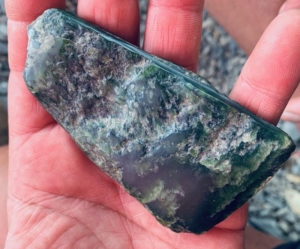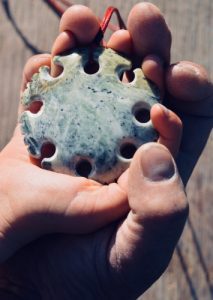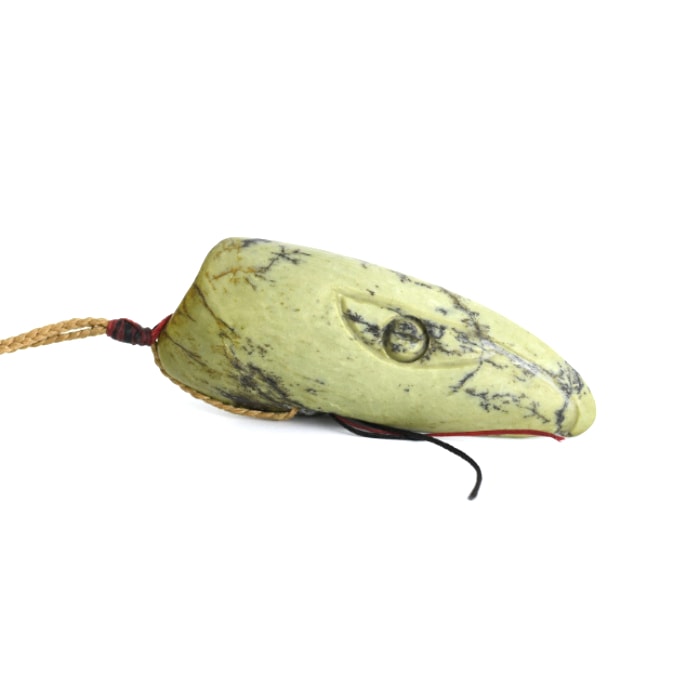You know who you are. You love pounamu. You admire its majestic beauty, it’s permanence, and it’s intrinsic spiritual qualities. What you’d like more than anything is to have your own pounamu taonga. You’ve spent hours looking for just the right one. And because you know you’re not allowed to buy it for yourself you’ve left hints for all your whanau and friends hoping they’ll take the hint and gift you one. But it never seems to happen, you are still without your desired taonga because no one is gifting it to you……
Have you ever heard somebody say “you cannot buy pounamu for yourself, it has to be gifted to you”? Or have you been told it’s bad luck to buy your own pounamu taonga? Maybe you’ve even said it yourself. It’s a common line here in Aotearoa. I know I grew up hearing this and took it for granted that somebody said it for a good reason. But when Tim and I sat and thought about it, we began to wonder where this idea came from. Tim certainly hadn’t grown up with this knowledge in his whanau. Why can’t you buy pounamu for yourself? What will happen if you do? More importantly, is there any truth behind this belief? We decided it was about time we took a good look into this idea to find out the truth for ourselves.
So the research began. We read a lot of books and websites, spoke to kaumatua and other experts in the field and just generally tackled every relevant person we met with these questions.
CAVEAT; Before we dive in let me make it clear that in everything we do here at Taonga By Timoti we look to Tim’s tupuna to inform our actions. We work at understanding how they would have approached the matter and use that as our guide. We are not here to tell you what you should think or do, our goal is simply to share what we have learnt and put it out there for others to consider and to take on their own journey of learning.
The fascinating thing is that everything we were learning on this topic led us to the conclusion that this whole idea of it being bad luck or culturally in-appropriate to buy pounamu for yourself is just basically incorrect. To put it simply, historically pounamu was a highly prized item, sought after for its strength and beauty, and was used as a tradable commodity up and down the country.
Let’s Start At the Very Beginning…
If we go right back to the first known exchange of pounamu we hear the story of Raureka of Ngāti Wairangi, the first people to live on the Poutini coast and work with pounamu. Raureka found a way across the mountains to the east coast of Te Wai Pounamu where she came across some men from the Ngāi Tahu iwi. After watching them work she commented on the bluntness of their tools and showed them her sharp pounamu adze. The Ngāi Tahu men returned with her to fetch some pounamu and learned the route to access this valuable material. 
Raureka didn’t give the pounamu to Ngāi Tahu as a magical, mystical gift. She recognised she had something of value that they didn’t and that there was plenty of it back home so she welcomed them over to get some for themselves.
Over time Ngāti Wairangi and Ngāi Tahu iwi came into conflict as they both recognised the value in this resource and sought to control the access and use of pounamu. After a series of battles Ngāi Tahu won control of the pounamu and began to supply it to their relations on the east coast, and so began the trading of pounamu around Aotearoa.
But this is just the beginning of understanding. To really see the big picture of where the idea of only gifting pounamu came from we need to dive into what trading looked like for pre-European Māori and explore the spiritual significance of pounamu to Māori.
What Pre-European Māori Trading Looked like
Before Europeans arrived on the scene Māori trading arrangements did not look like our modern idea of trade or barter. Traditional Maori trading was more of a ritualised gift exchange – “homai o homai”, a gift for a gift. (https://www.maori.info/maori_society.htm). An iwi or hapu on a friendly visit would take with them a variety of “presents”(you need to step out of our modern day notion of what presents are here). These presents were usually chosen to supply what their hosts would most appreciate or lack. Seaside visitors would take fish to inland whanau, inland dwellers would supply birds and rats and hinū. Hapu with celebrated artisans would give articles such as carvings and garments. There was no element of barter as we understand it, it was gifting between visiting friends.
Custom required the hospitality be reciprocated and that the reciprocal gift must not only match the original gift but surpass it. This reciprocity ensured the continued cycle of gifting and receiving. So, if you were the iwi with access to a localised stone suitable for making tools and weapons, such as pounamu, you would take this gift item with you as an item that would receive a much more valuable gift in return(again, you need to step away from your modern understanding of gift giving here). 
And, we believe, herein lies the beginning of the modern-day concept that pounamu can not be bought for oneself but must be gifted – ‘homai o homai’. Because this is how all items were traded amongst pre-European Māori, as gifts given in continued reciprocity for previous gifts given. A system of trade totally alien to our European understanding of trade and exchange.
Taken to it’s extreme you could argue that if we are going to continue this traditional practice with pounamu then it should be extended to all items historically traded by Māori that are still exchanged as a commodity today, such as kumara or toi rakau for example. But this is not how the economy works any more.
When Europeans arrived in Aotearoa Māori were quick to learn and engage with the European system of trade, exchanging goods of equal value in payment(bartering) and then later on using money in the place of physical items. (https://teara.govt.nz/en/te-maori-i-te-ohanga-maori-in-the-economy/page-2)
And so pounamu began to be exchanged in this way also. Europeans had a great love and fascination for this magical stone and the beautiful items Māori carved from it. It was not long before Māori were exchanging some of their pounamu items for goods of equal value, such as metal tools. And we continue this practice today, exchanging the ‘gift’ of money for the reciprocal ‘gift’ of a pounamu taonga.
The Spiritual Value of Pounamu
Another element of this idea that pounamu can only be received as a gift lies in the spiritual value of pounamu for Māori, and Pakeha. I think this piece from Media NZ summarises why pounamu is so important to Māori and Pakeha.
“Pounamu is a vessel which can house the essence of things. Through spiritual practices, pounamu can be cleansed and imbued with purpose. It can also enhance and protect the mana of its possessor….pounamu is culturally significant to Māori and all New Zealanders because it links heaven and earth, along with the stars and water. Whanau or families who maintain their heirloom pieces keep a connection with their heritage and history.” (https://media.newzealand.com/en/story-ideas/pounamu-%E2%80%93-protecting-nzs-precious-heritage/)
Pounamu taonga(all taonga in fact) are spiritual beings with character, wairua and mana.
Pounamu was so highly valued that Māori guarded it with their life. When raiding parties came it would be hidden away so that it would not be stolen and significant efforts would be taken to recover any taonga that were stolen. Pounamu mere buried with their rangatira were so highly valued that they would be recovered one maramataka year later to be passed down the whanau line. And we can still witness today what a momentous and emotional occasion it is when these taonga are returned to iwi from foreign lands.
Because of the spiritual significance that pounamu held it was often gifted on significant occasions as a symbol of honour, respect and permanence. Pounamu heirlooms or weapons of great status were exchanged between parties as symbols of peace agreements.
When we begin to understand the spiritual significance that the gifting of pounamu had historically it’s not a big leap from there to see how people would want to continue this concept of gifting pounamu as a spiritually significant present. By wrapping the gifting of pounamu in these stories of bad-luck and curses on those who buy it for themselves we add to the mysticism and spiritually of the pounamu. Hereby making the gift even more significant and valuable. It makes for great marketing eh? Just think on it….
What Does This All Mean For Me?
These concepts warrant a lot more research and discovery. But we hope that with just this brief look into Māori history we can see that pounamu was traded up and down the country. It made a valuable commodity in the ‘homai o homai’ system of trade as it was highly prized for its physical properties, spiritual qualities and what it symbolised. To be gifted a piece signified much about the relationship between the giver and receiver. It was a way of showing a person how much you value and respect them, their word and your relationship with them. And this tradition of gifting pounamu as a symbol of our respect, admiration or love for another continues today.
However whether you are buying a pounamu taonga for a loved one or yourself, you will be ok. It will not bring you bad luck. You are not disrespecting any ancient cultural practises or traditions. No curses will fall upon you. Your pounamu taonga will be imbued with your wairua, add to your mana and become the symbol of honour and permanence that it has always been.


